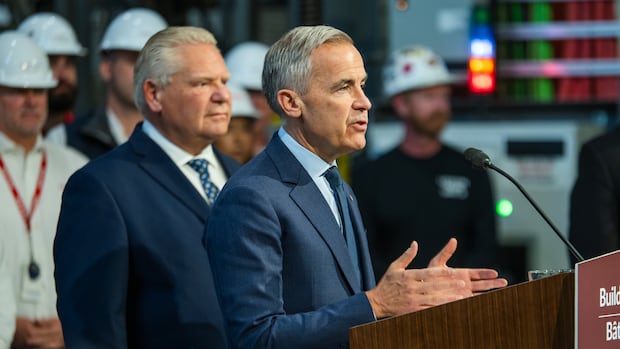The federal government is hitting back at Stellantis and General Motors by limiting the number of duty-free vehicles the automakers can import from the U.S. to sell in Canada, CBC News has learned.
The two multinational manufacturers will no longer be exempt from paying Canada's retaliatory tariffs on the same number of U.S.-assembled vehicles as before, the sources said.
The move is expected to force companies to reinvest in Canadian manufacturing and workers to recapture those benefits and avoid large tariff bills.
“I think Canadians and the industry want the government to be tough on the companies that don't own these partnerships, which in many cases are worth billions,” said Flavio Volpe, president of the Automotive Parts Manufacturers Association.
“It's a great move.”
Ottawa's action comes after Stellantis announced its U.S. expansion plan, including moving production of the Jeep Compass from Brampton, Ontario, to Illinois.
General Motors also confirmed Tuesday that it is ending production of its BrightDrop electric vans at its Ingersoll, Ont., plant due to demand.
In April, the federal government offered auto companies an exemption from Canada's 25 percent retaliatory tariffs on the U.S. auto sector.
The federal government has announced that automakers will be allowed to import a certain number of U.S.-assembled vehicles—those that comply with CUSMA—without countermeasures imposed by Ottawa in response to Trump's tariffs.
But this advantage came with strings attached: automakers had to continue producing vehicles in Canada and complete already planned investments.
If companies violate this condition, the government has warned it will limit the number of duty-free cars they can import from the US.
Sources told CBC News the government now believes Stellantis and GM no longer meet that requirement, so Ottawa is lowering the remission rate quota until the companies make good on their promises.
Effective immediately, the government is cutting the number of U.S.-built vehicles GM can import duty-free by 24 percent and cutting the number of Stellantis by 50 percent, the sources said.
CBC News is not identifying the sources with knowledge of the government's move because they were not authorized to speak publicly about it.
Hugh Williams, national spokesman for the Canadian Automobile Dealers Association, says the government's actions will hurt Canadian consumers.
“Vehicle prices will rise as tariffs increase,” Williams said.
“We've made it clear to the government that when your trading partner shoots you in the foot, don't pull out another gun and shoot yourself in the other foot.”
Trump is playing hardball
But Unifor national president Lana Payne said she believes Ottawa's “carrot and stick approach” will work.
Payne said US President Donald Trump is now playing “hardball” and is “extorting corporations” to try to move manufacturing to the US.
“He's doing everything he can to surgically destroy our industrial economy in Canada, including the auto industry,” Payne told CBC. Power and politics.
“If we don't stand up to him and these companies, we will lose everything.”
Canadian politicians of all stripes have expressed anger and frustration over the move of Jeep Stellantis production from Brampton, Ontario, to Illinois, and Ottawa is considering legal action.
Industry Minister Mélanie Joly called Stellantis' actions unacceptable and threatened legal action, noting that the government had allocated millions of dollars to the company.accountsensuring that Stellantis maintains its presence in Canada.
Jolie warned on Tuesday that she was looking for ways to put maximum pressure on the company to meet its obligations.
She wrote on social media Thursday that she had met with GM, the Ontario government and the union to discuss the next step for workers and that she expected an update in 15 days.
Ontario Premier Doug Ford has threeintends to sue GM if it breaks its contract and does not find a new product for the Ingersoll plant.
Prime Minister Mark Carney said Thursday that while GM has said it will meet its obligations to pay workers, that is not enough.
“We are not happy with this,” he said.
In a statement from Ford, Carney said they are working to figure out what else can be done with the GM plant and whether it could become part of Canada's upcoming defense industrial strategy. Carney is working on a plan to move Canada away from its overdependence on the United States.
Carney also pointed to ongoing negotiations with the Trump administration to try to get some parts of the economy relief from hits from U.S. tariffs.
The prime minister warned that if Canada doesn't make progress in those negotiations, the government will “do whatever is necessary to protect our workers.”
“It starts with building and taking control there. But that also doesn't mean unfair access to our market if we don't have access to another market,” Carney said. “We're in the wrong place.”
Reporters asked Prime Minister Mark Carney about his approach to trade negotiations with the United States, highlighting differences with the approach of Ontario Premier Doug Ford, who has advocated tougher handling of the Trump administration.
Trump has made it clear that he wants to dominate the auto industry. The White House has hit Canada's auto sector with a 25 percent tariff on all finished vehicles that do not comply with the Canada-United States-Mexico Agreement (CUSMA).
U.S. Commerce Secretary Howard Lutnick told an audience in Toronto this month that he wants to move auto assembly out of Canada.
Carney said Canada pays the lowest tariffs on cars and auto parts in the United States, but added that this needs to be done as part of “larger negotiations” with the Americans.
“We have the best deal on cars, but we have to work to make it even better,” he said.
Conservative Leader Pierre Poilievre criticized Carney on Thursday morning, saying he had broken his promise to negotiate a victory with Trump and protect Canada's auto sector.
“We need him to actually keep his promise to protect auto workers in his negotiations with the Americans,” Poilievre said.
The Trump administration is examining whether auto imports threaten national security.











